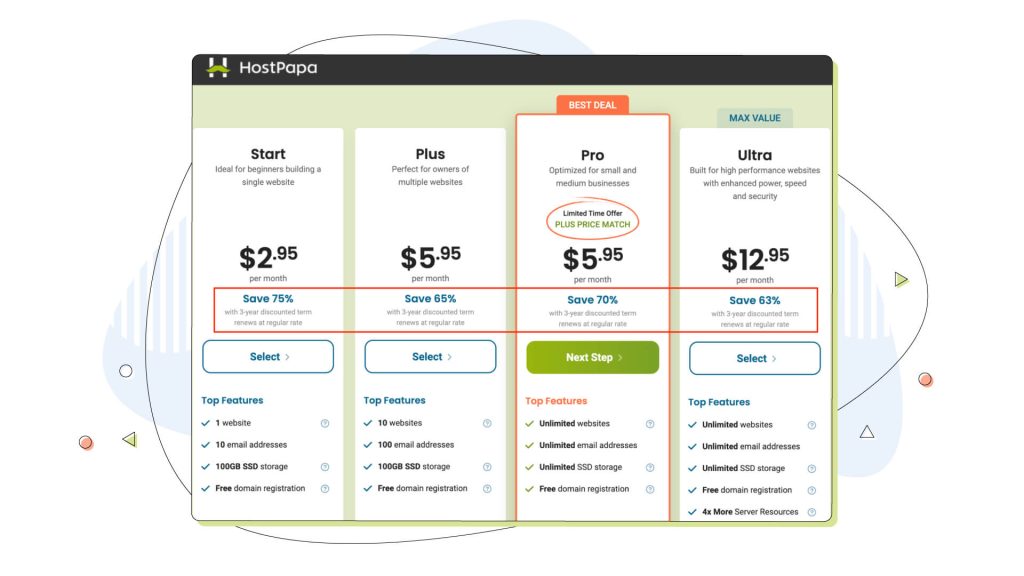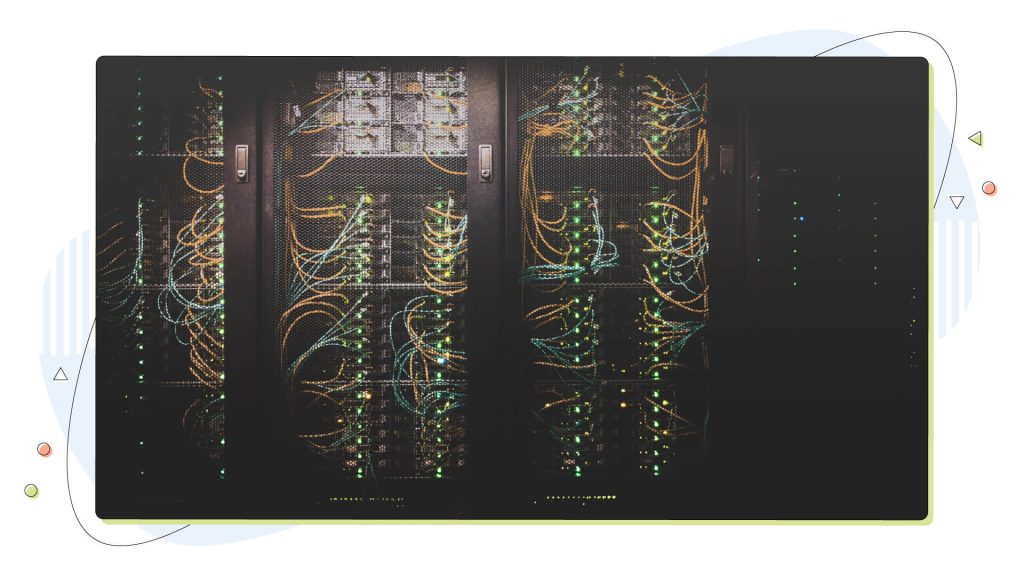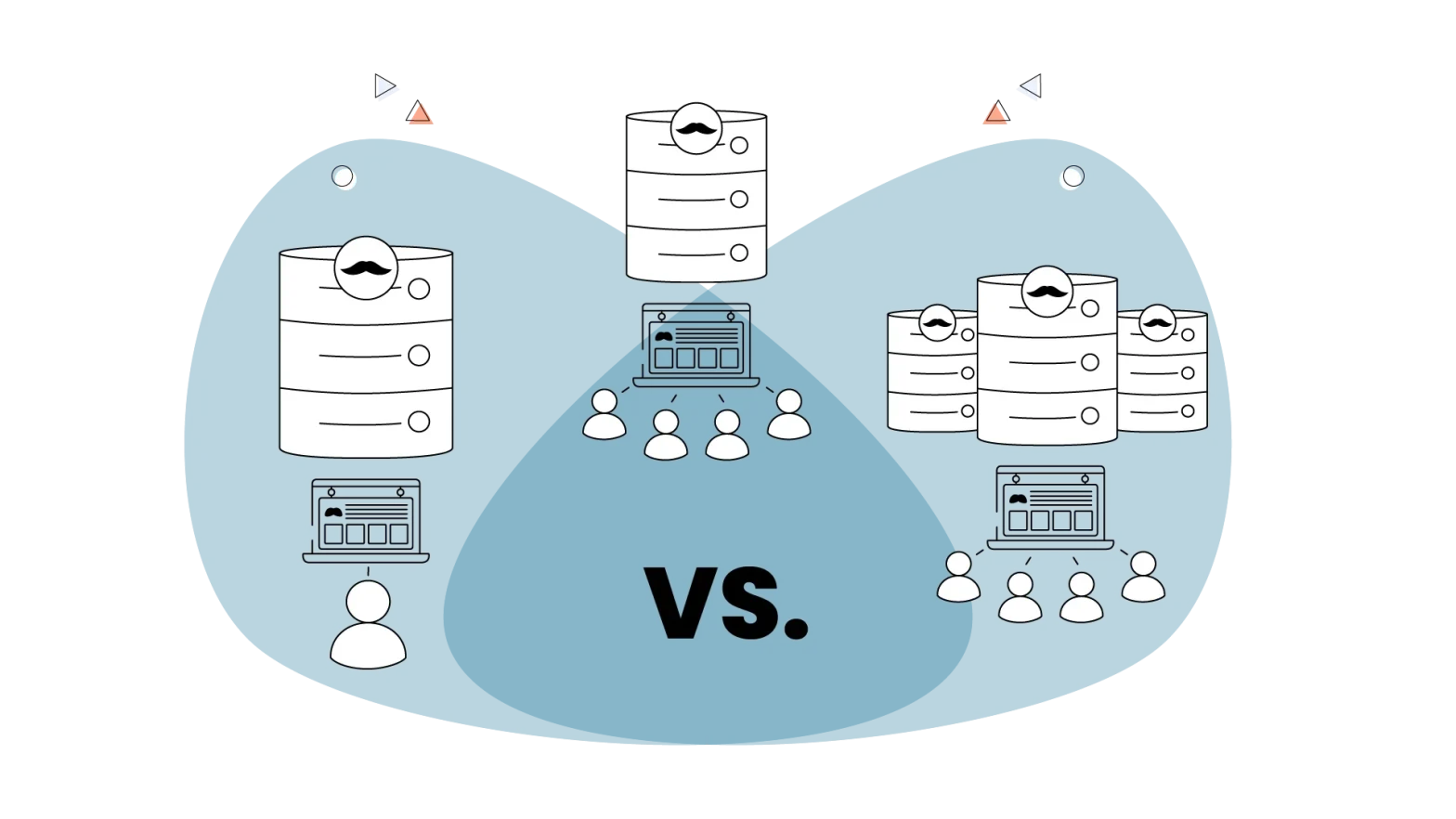One of the first steps to take when building a new website is to choose a hosting platform.
But with terms like “shared,” “dedicated,” “VPS,” and “cloud” floating around, how do you determine the right fit for your unique needs? Each hosting type has pros and cons, tailored for specific use cases and budget constraints.
In this guide, we’ll compare four server types for web hosting. We’ll discuss everything you need to know about shared, dedicated, VPS, and cloud hosting, including pros and cons, costs, and ideal use cases.
To wrap things up, we’ll share some tips for choosing the best web hosting solution for your needs. Let’s dive in.
- The Four Types of Web Hosting
- Shared Hosting
- Dedicated Hosting
- VPS Hosting
- Cloud Hosting
- How to Choose the Best Web Hosting Solution
The Four Types of Web Hosting
There are four main types of website hosting: shared, dedicated, VPS, and cloud hosting. The main difference between these types of web hosting is:
- The type of server
- How the server stores the content
Each type of hosting is available at a different price point and comes with different pros and cons. Naturally, this makes each type of hosting better for other use cases and project scales.
To determine which type of hosting makes sense for your project, it’s crucial to fully understand the differences between shared vs. dedicated vs. VPS vs. cloud hosting. Let’s take a closer look.

What Is Shared Hosting?
Shared hosting is a type of web hosting that hosts multiple websites on the same physical server. A shared server can host hundreds of websites simultaneously, so all the sites on the server share a finite amount of resources.
Since quite a few websites use the same resources as shared web hosting, users who opt for shared hosting may run into issues with performance.
For example, if several of their server “neighbours” are using more resources than usual, they’ll have less access to resources.
Cost of Shared Hosting
Shared web hosting is the most cost-effective option. You can expect to pay anywhere from around $1 to $15 per month for shared hosting. Many hosting solutions provide discounts if you pay for the year in full.
For example, HostPapa offers significant discounts on hosting when you purchase a 3-year term upfront.

Ideal Use Cases of Shared Hosting
Shared web hosting is ideal for use cases where budget is a concern, specifically for small businesses, blogs, personal sites, etc.
However, it’s wise to consider another hosting option when security is a major concern or if you’re storing sensitive information.
Pros of Shared Hosting
Here are a few pros of using shared hosting for your website needs.
Easy to Setup and Upgrade
Shared hosting is an extremely user-friendly option. It’s very easy to set up, and it requires little to no maintenance.
It’s also easy to manage. So, as your small business expands, you can upgrade or scale up as your business needs grow.

Low Cost
Another major benefit of shared web hosting is that it is quite an affordable solution. As we mentioned, it is the cheapest type of web hosting available, which makes it accessible to brands and personal sites with any size budget.
Cons of Shared Hosting
Here are a few downsides of shared hosting.
Shared Resources
With shared hosting, each website is allotted its own slice of available resources.
Suppose another site hosted on the shared server is experiencing a higher volume of users. In that case, there’ll be less bandwidth and processing power for other sites on the server, which can cause issues with reliability and speed.

Security Concerns
Since your data sits on a shared server with other websites, all information funnels into a single directory. Each website hosted on a shared server can become an entryway to the directory for hackers, making it easy for a security breach.
That’s why the server is much less secure than the other types of web hosting solutions.
To mitigate these concerns, additional security measures like HostPapa’s Protection Power can be added to a shared web hosting account, strengthening the website’s core.
Potential Negative SEO Implications
Some SEO professionals believe that shared web hosting can negatively impact SEO. The thought is that spammy domains on shared servers can also reduce your domain authority.
This is a controversial take, but a recent experiment backs it up.
What Is Dedicated Hosting?
Dedicated hosting is an approach to web hosting that provides a dedicated server for each website. Dedicated server hosting doesn’t require any sharing, so all of the bandwidth and resources on the server are for your website.
Like shared hosting, dedicated hosting uses a physical server. This server has limited resources. But in comparison, with dedicated hosting, all the resources are yours. Having access to the entire server to power your site will provide enhanced site performance. The result? A faster website, a better customer experience, and improved SEO.
Cost of Dedicated Hosting
Dedicated hosting is on the more expensive end. You can expect to pay anywhere from around $80 to $500 per month for dedicated hosting.
Ideal Use Cases for Dedicated Hosting
Dedicated hosting is valuable for situations where users need a lot of power from their web hosting solution.
For example, websites with millions of visitors will need more resources to ensure fast load times and optimal performance. This performance is crucial for ecommerce sites where transaction speeds and user experience can directly impact sales.

This hosting solution is best suited for those with a larger IT budget.
Pros of Dedicated Hosting
Here are the main benefits of dedicated hosting.
Advanced Security
This solution is more secure since dedicated hosting hosts only one site on each server. When you use dedicated hosting, your site isn’t at risk of being compromised due to weak security on other sites since there aren’t any other sites on the server.
More Reliable
Dedicated hosting is more reliable since all of the bandwidth on the server goes to only your site. You don’t have to worry about other sites taking up the resources and causing delivery issues with your site.
Plus, since there aren’t other sites to take the server’s resources, you don’t have to worry about it causing the site to load slowly.
Highly Customizable
Some businesses might need a specific server setup or want to install a particular software. A dedicated server allows for greater customization and control over the server environment.
And since all of the server resources are yours, you can configure and allot the resources to best meet your unique needs.

Cons of Dedicated Hosting
Conversely, let’s explore the downsides of dedicated hosting.
More Expensive
Since dedicated web hosting provides a unique server for your site, it’s quite a bit more expensive. However, for some users, the cost is worth it for all the benefits of dedicated hosting.
Requires Skills to Manage
Hosting a website with a dedicated hosting solution requires technical skills since you’ll need to make custom configurations. This requirement may be a roadblock for some users.
Fortunately, many dedicated hosting solutions offer comprehensive support.
Limitations on Scalability
The downside to using an entire server is that you’ll have to purchase access to an additional server if you want additional resources.
It’s impossible to scale by adding a piece of a dedicated server. So, you must go all in with the investment in another full server.
What Is VPS Hosting?
Virtual Private Server (VPS) hosting is a web hosting setup that marries shared and dedicated hosting. With VPS hosting, multiple sites use the same physical server, but each site is allocated hosting resources.
What’s nice about VPS hosting is that even though you’ve allocated resources, additional resources are available when you need additional support.
It can handle website traffic spikes more efficiently than shared hosting. It also is much more cost-effective and easier to use than dedicated hosting.
Cost
VPS hosting is a middle-of-the-road solution from a cost perspective. You can expect to pay between $20 and $100 per month for VPS hosting.
Ideal Use Cases
VPS hosting is great for users who need more dedicated resources than shared hosting but don’t have the budget for dedicated hosting.
Pros of VPS Hosting
Here are a few pros for choosing VPS hosting for your website needs.
Dedicated Resources
Access to dedicated server resources is the most prominent benefit of VPS hosting. This setup avoids any snags with delivery and provides better performance.
Security
VPS hosting is a secure option, especially compared to shared hosting. The technology that separates the resources on the server doubles as security measures, so you should be safe even if other sites on the server are hacked.
Scalability
While VPS hosting is less scalable than shared hosting, it’s more scalable than dedicated hosting since users can pay for more server space as they grow.

Plus, VPS hosting comes with some customizability, which is also great for scaling.
Cons of VPS Hosting
Here are the potential drawbacks of VPS hosting.
Slightly Costly
Although VPS hosting is less costly than dedicated hosting, it’s more costly than shared hosting. However, for many users, this is less of a con and simply more of something to be aware of.
What is Cloud Hosting?
Cloud hosting is a type of web hosting that leverages virtual servers to host, manage, and deliver web content. Cloud servers use cloud computing technology instead of physical hardware.

Cost
Cloud web hosting is a somewhat expensive solution. You can expect to pay anywhere from $20 to $100 per month. Pricing for cloud server hosting depends on usage, so higher-priced plans usually come with more storage, RAM, and CPU allocations.
Ideal Use Cases
Startups or tech companies launching new web applications can benefit from the ability to scale resources up or down as user traffic fluctuates. For applications that might experience unpredictable growth or sudden spikes in traffic, cloud hosting offers immediate scalability.
Cloud hosting provides a reliable environment for backing up data. If there is a disaster, it’s quick to restore data from a cloud backup, minimizing downtime.
Pros of Cloud Hosting
Here are the pros of cloud hosting.
Easy to Scale
Physical technology isn’t a constraint in cloud hosting services, so scaling is extremely easy, which is great for businesses starting small and wanting room for growth.
When you can scale within the same technical infrastructure, it removes a lot of growing pains.
Reliable
Cloud servers are reliable since there are no significant constraints on usage. This setup is valuable for those with high-traffic websites and is generally great for website owners who want to ensure a consistently positive experience for their audience.
Very Secure
Most cloud hosting providers use impenetrable security standards to protect the data hosted on their servers. This feature is great for those who are storing or transferring sensitive data.
Customizable
Another perk to hosting on cloud servers is that they are highly customizable. Since there are no limits on a physical server, many providers can customize and configure their setups however they see fit.
Cons of Cloud Hosting
Somewhat Expensive
Cloud hosting services offer many benefits, but these benefits come with a slightly higher price tag. However, these costs are comparable to those associated with VPS hosting, yet cloud hosting is somewhat more powerful across the board.
Relies on the Internet
One potential downside to cloud hosting is that it relies on the Internet to store your data. In an internet crash, it’s possible to lose data, or your site could go down. Most popular servers have redundancies in place to prevent this from happening, but it’s always a risk.

How to Choose the Best Web Hosting Solution
When choosing between shared, dedicated, VPS, and cloud hosting, it’s essential to understand your unique needs and compare them to your budget.
One easy way to start is by listing your non-negotiables and wish list items. From there, you should crunch numbers on what you can afford monthly or annually. Finally, you should start searching for a solution that offers what you need for the price you want.
For example, a dedicated web host would be valuable if you have the budget and need more security and reliability. Conversely, sharing hosting is a decent option if you’re just getting started and not hosting a website that collects sensitive information. On the plus side, if the web host offers good support, plenty of documentation and a knowledge base where you can find most of the answers to your questions, then its benefits are more profound.
Final Thoughts
Shared, dedicated, VPS, and cloud hosting are all great options for different use cases.
For budding entrepreneurs, bloggers, or developers, the choice often boils down to balancing budget constraints with performance and scalability needs. Shared hosting may be ideal for those just dipping their toes into the digital world due to its affordability. However, as your online presence grows, you may find the robustness of dedicated servers or the flexibility of VPS more appealing.
On the other hand, cloud hosting stands out for its scalability and adaptability, serving the needs of rapidly growing businesses or applications with fluctuating traffic. The bottom line is that your specific goals, technical expertise, and expected growth trajectory should inform your hosting decision.
Taking the time to assess your unique requirements will ensure that your website runs smoothly and sets you up for long-term success.
About the Author
Emily Krings is an SEO content writer and strategist with a knack for storytelling. She specializes in helping B2B businesses create blog content that connects with their audiences.




